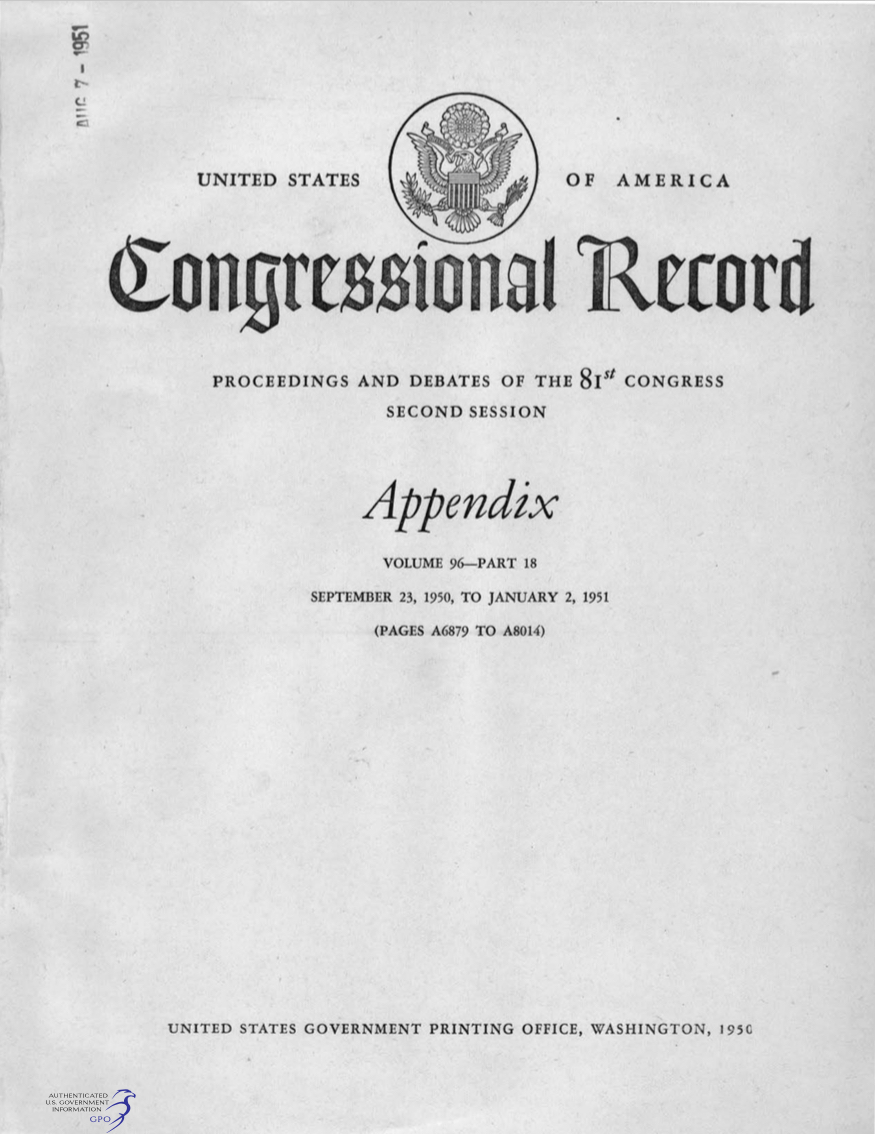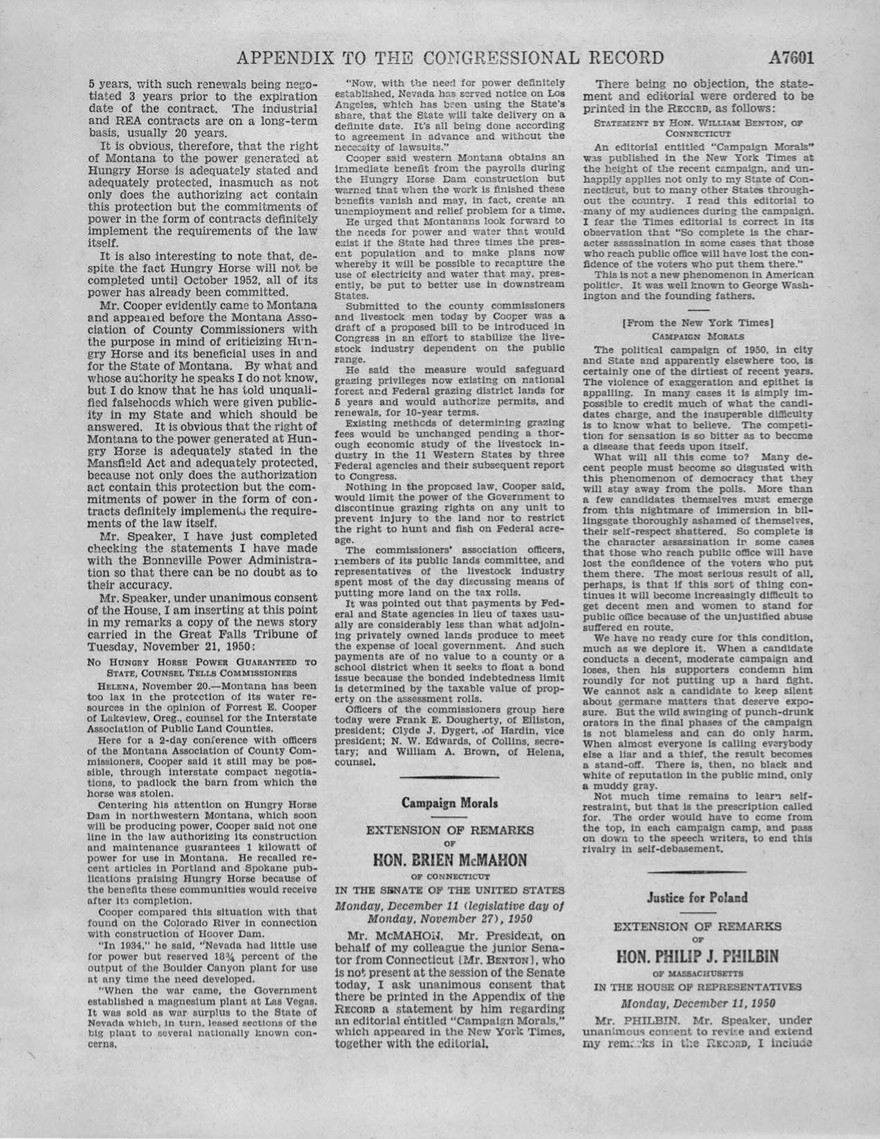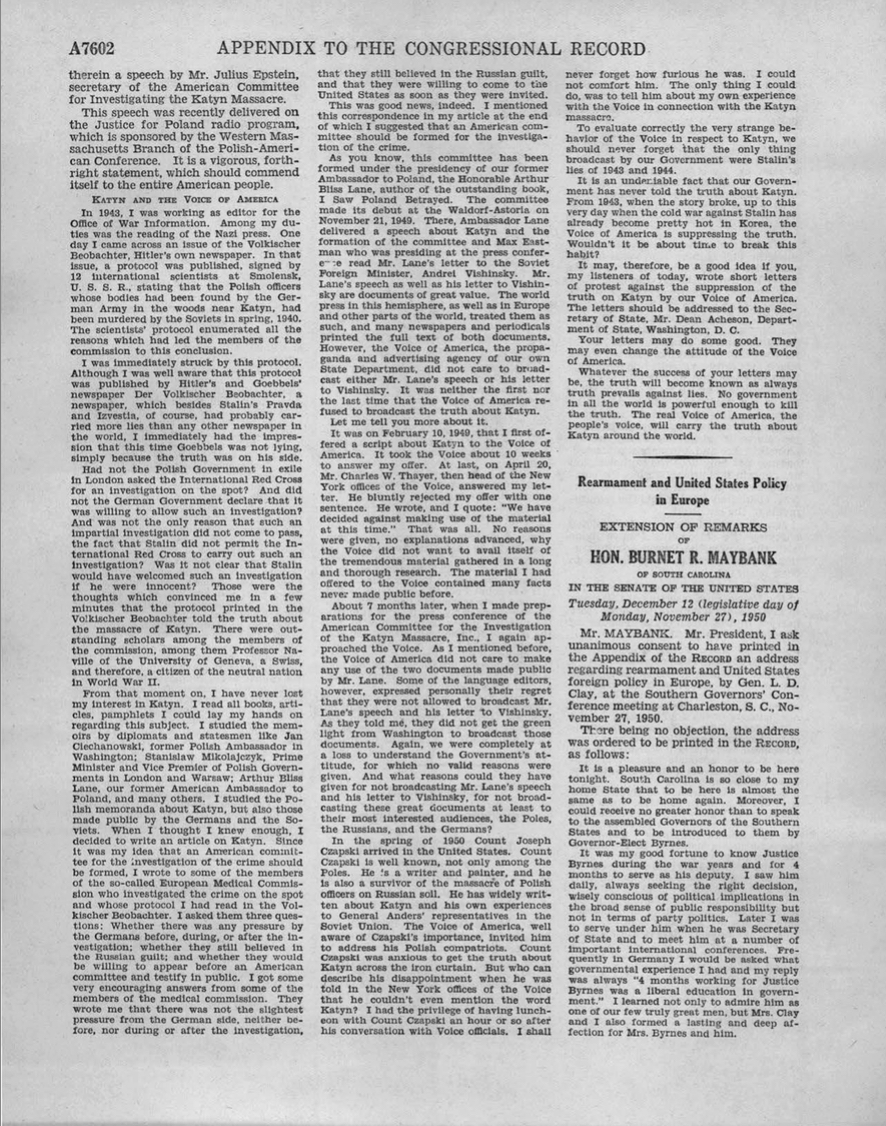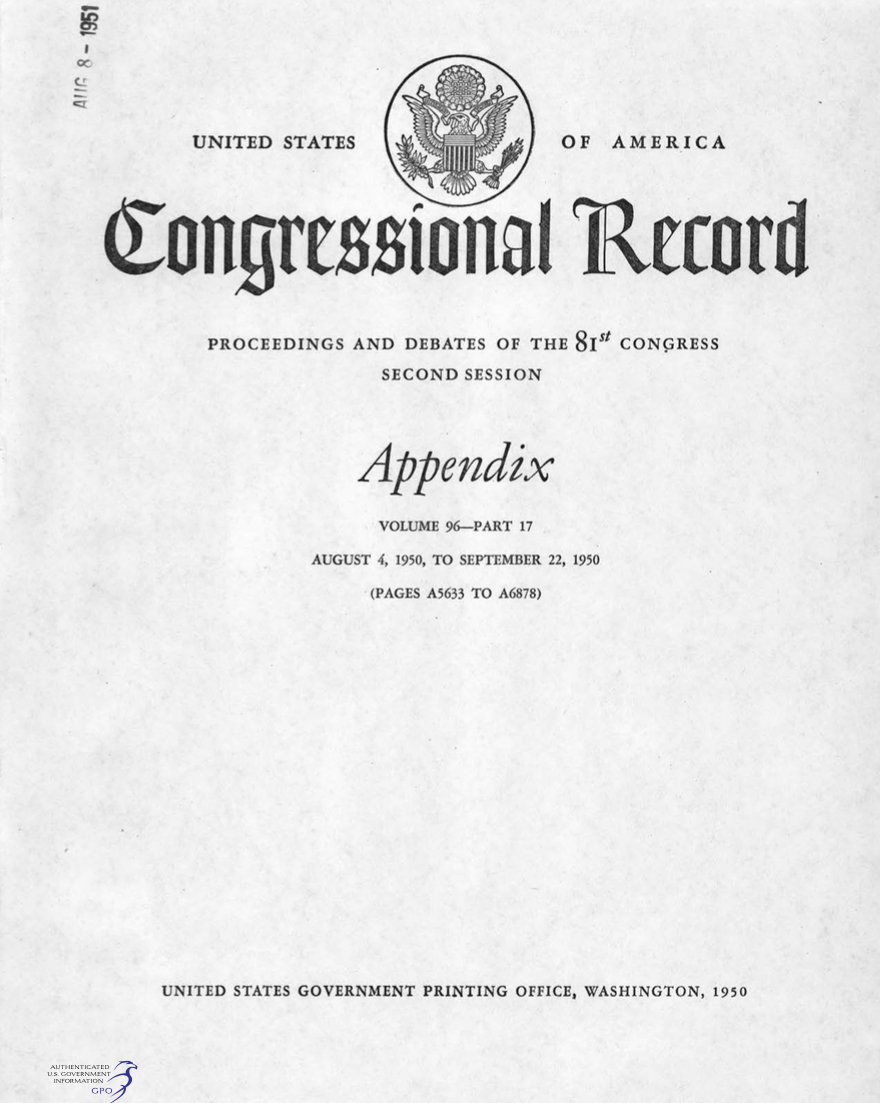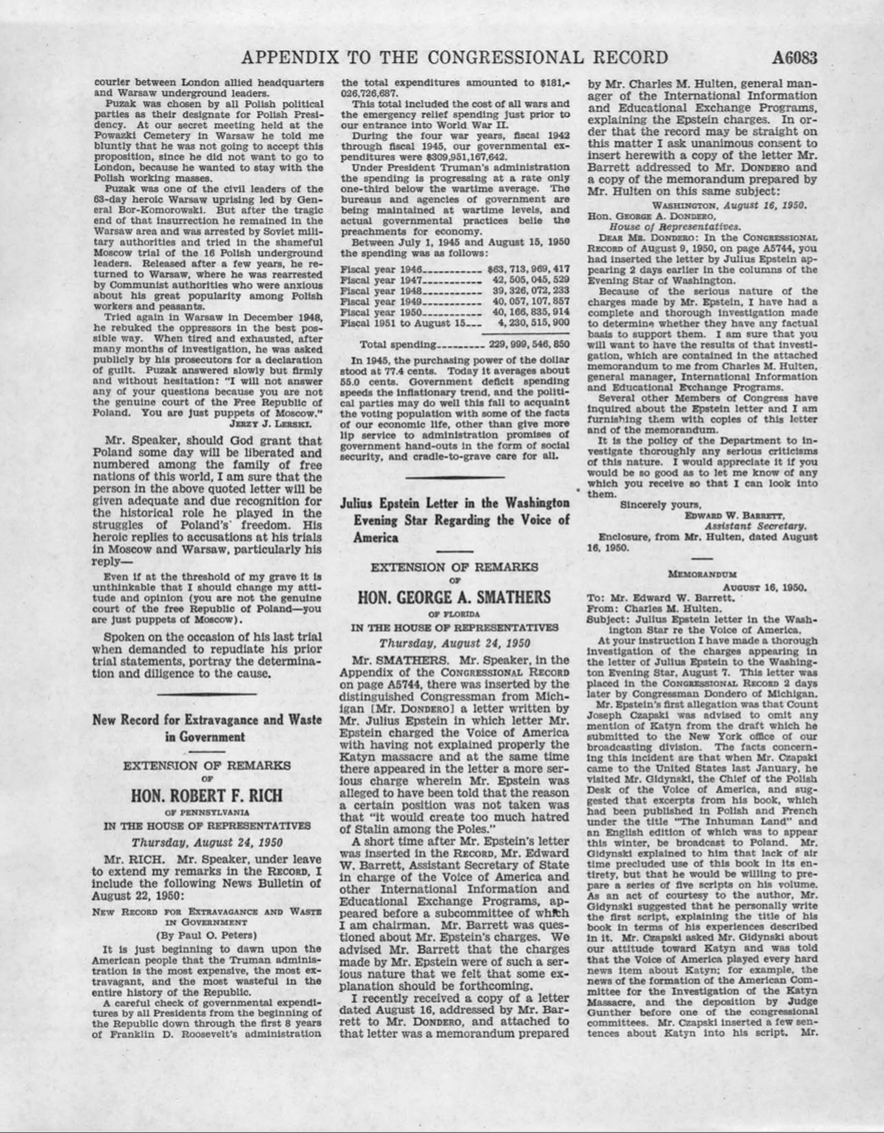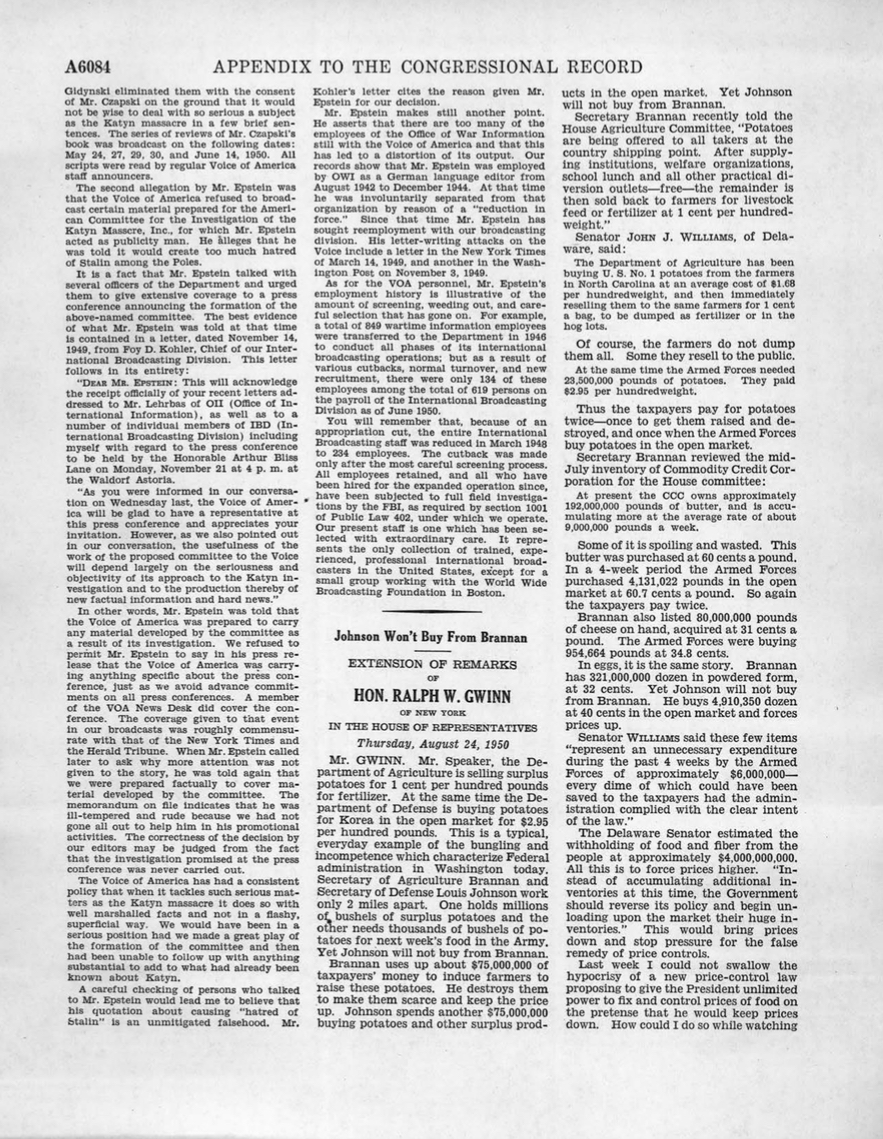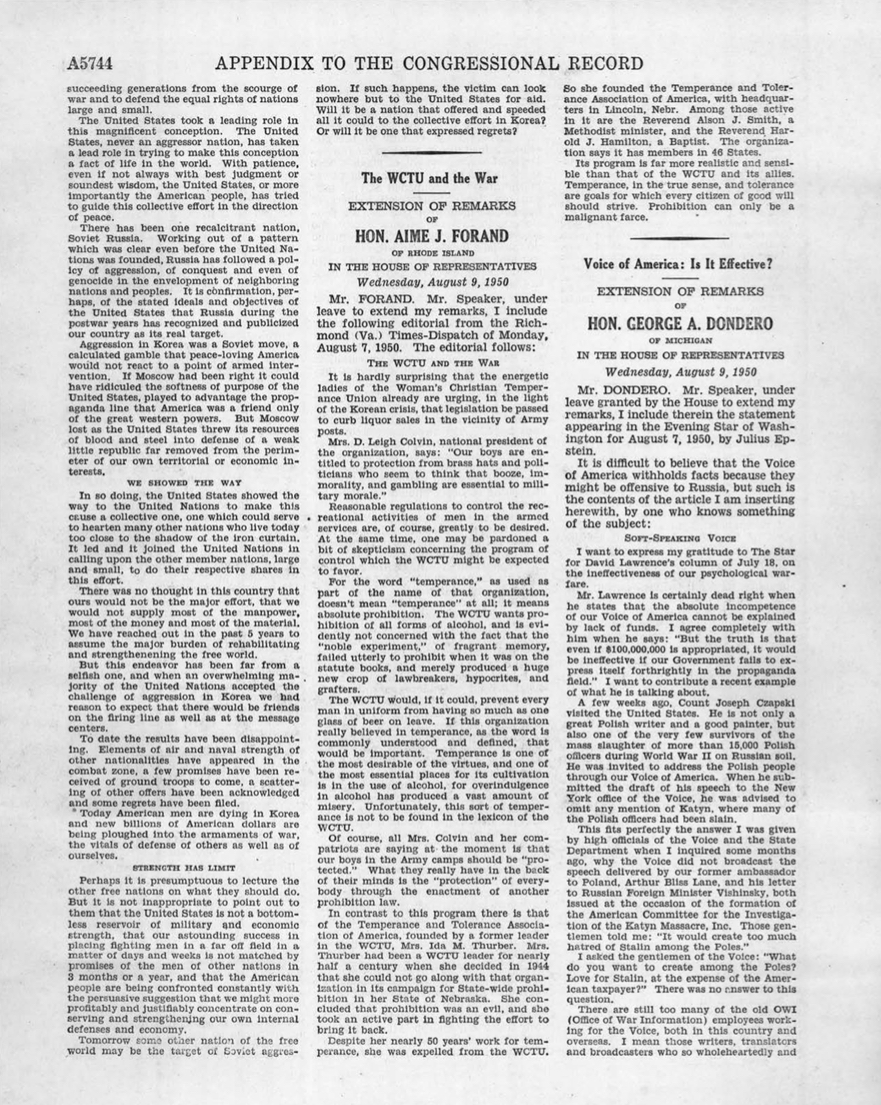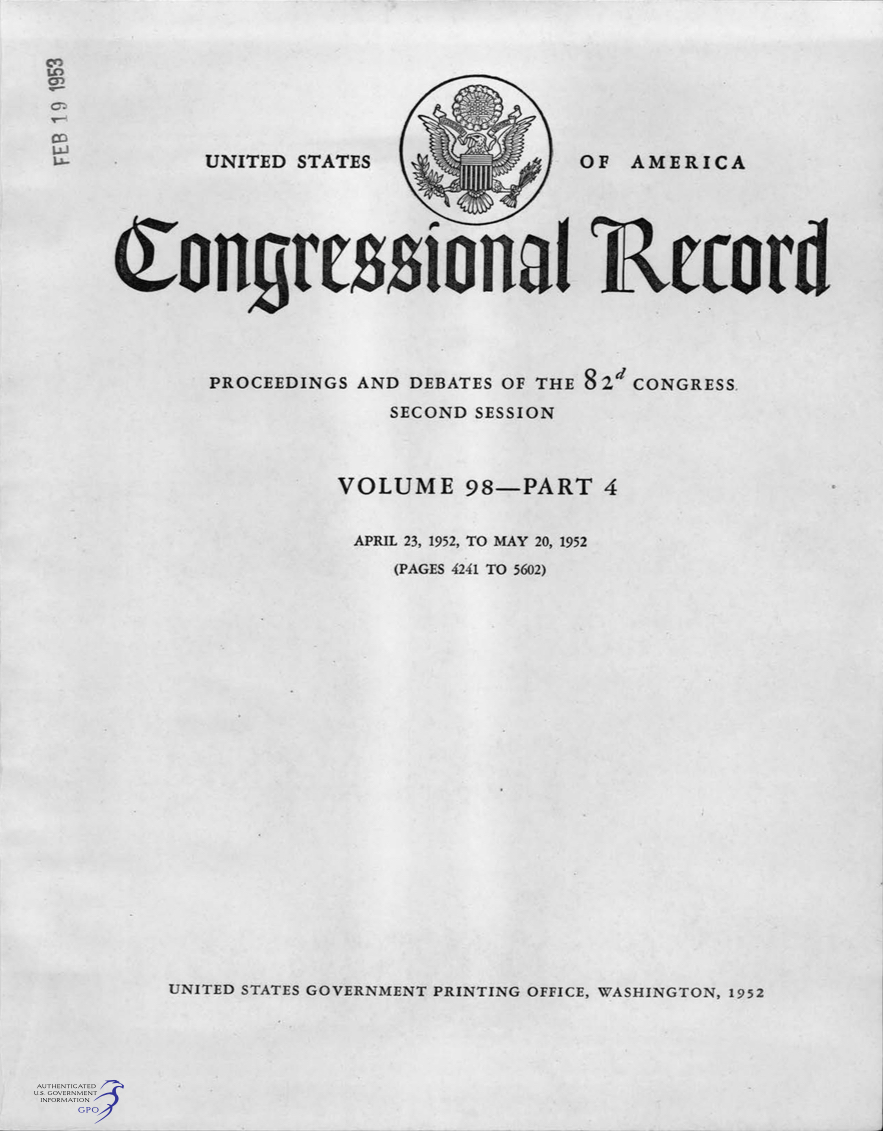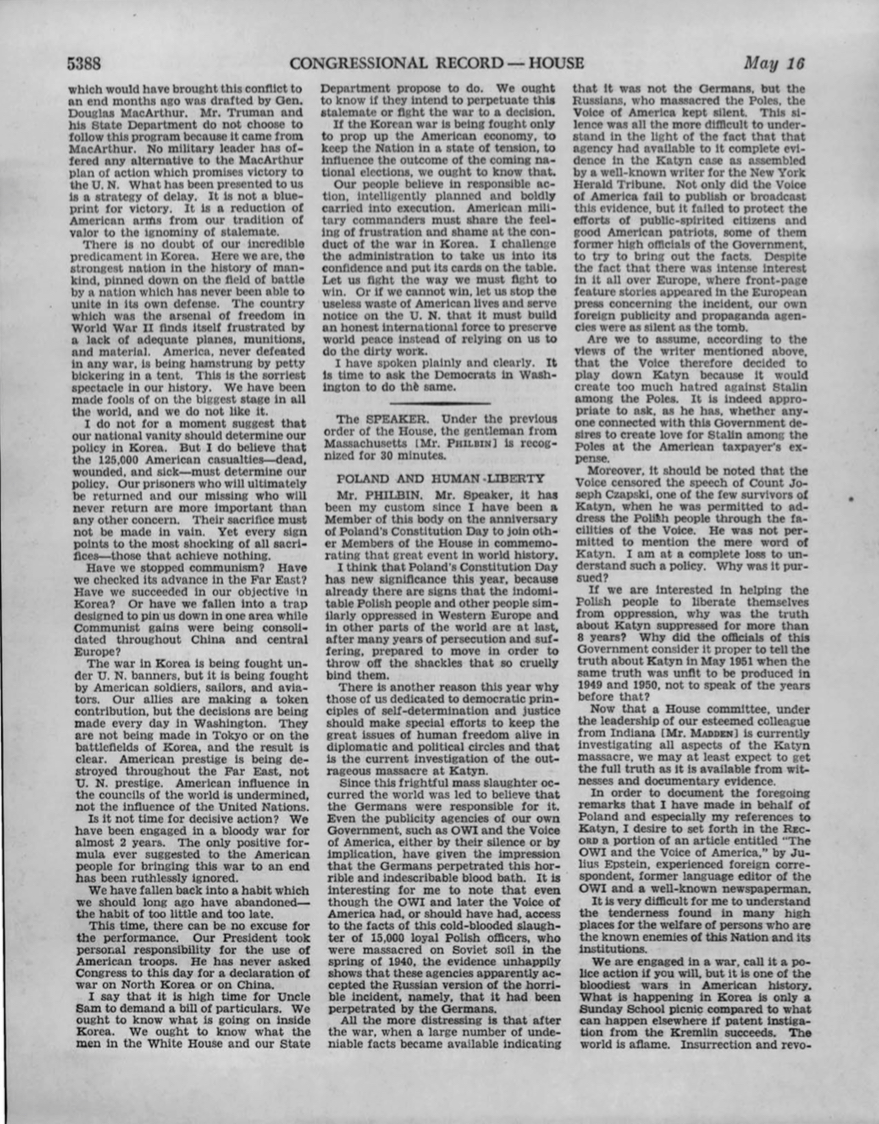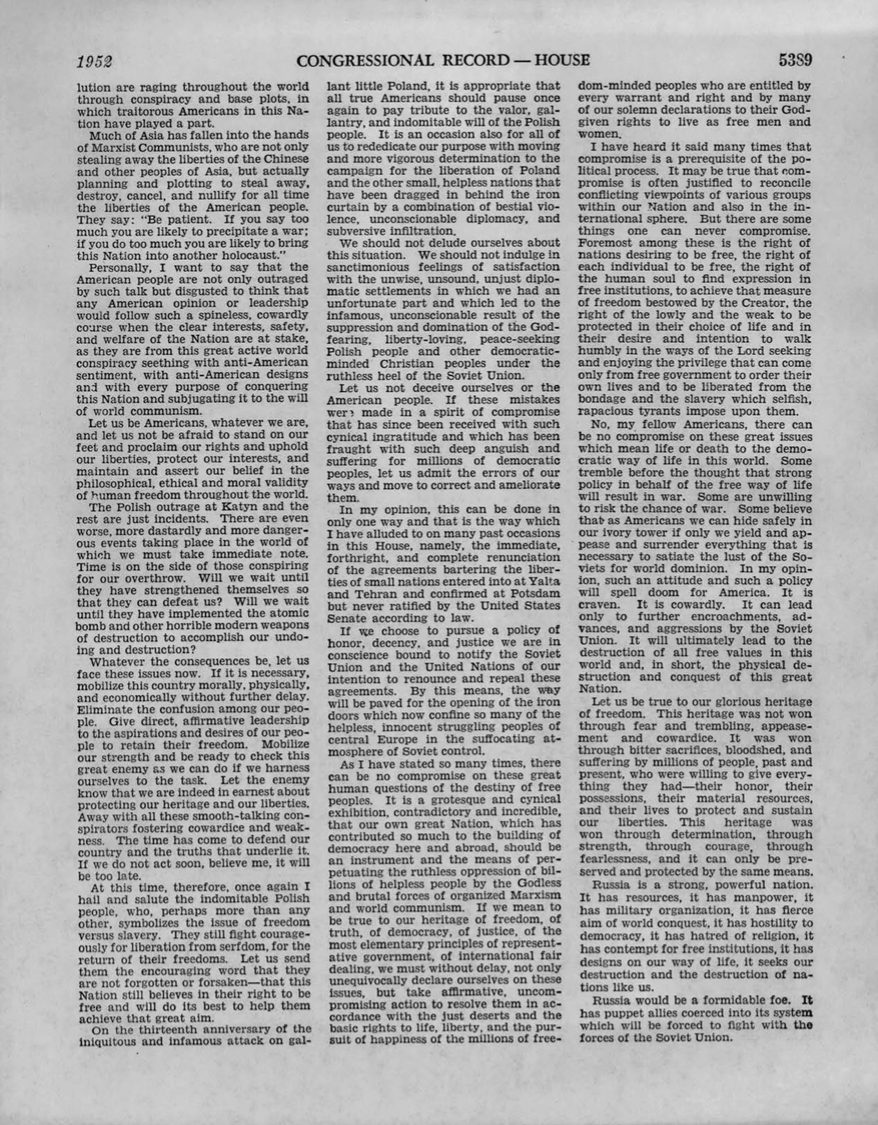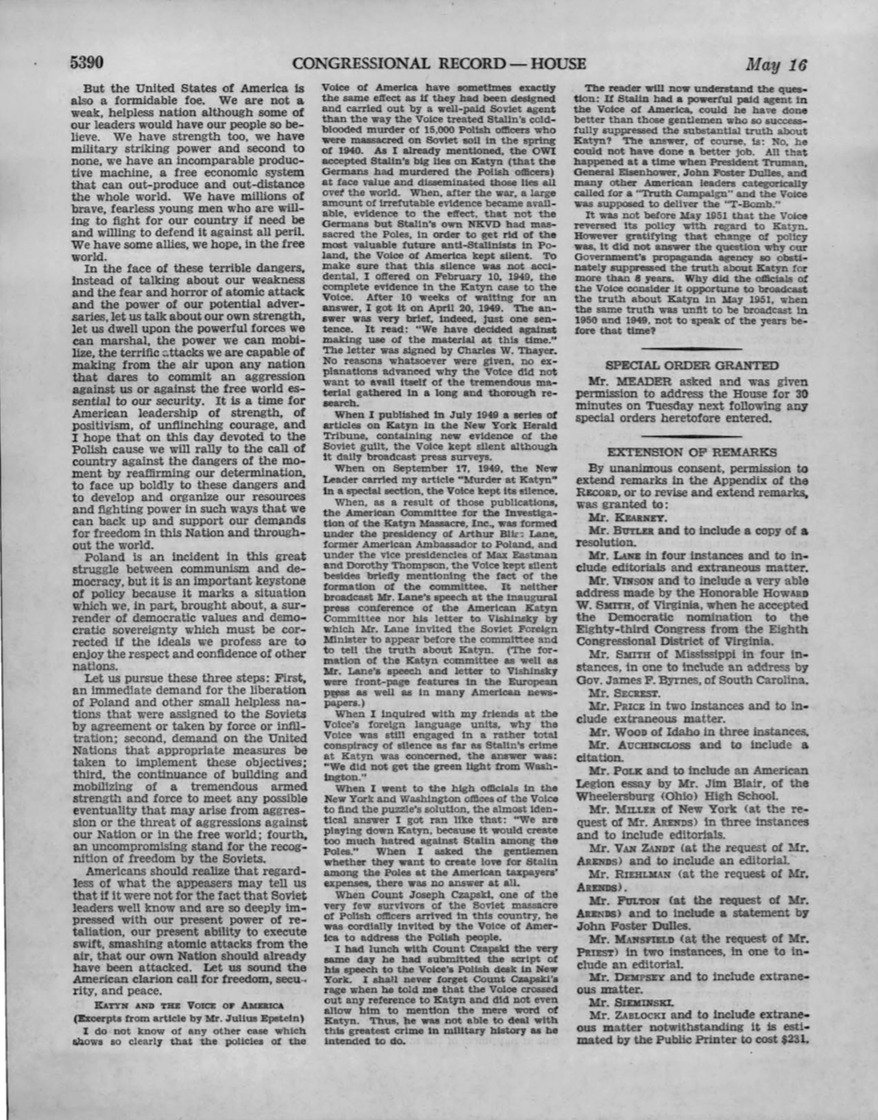Fascinating and until now generally unknown details of how a single refugee journalist, Julius Epstein, exposed Voice of America’s (VOA) censorship designed to cover up Soviet responsibility for the 1940 Katyn Forest massacre of nearly 22,000 Polish POW officers and intellectual leaders can be found in several volumes of the Congressional Record from the early 1950s and in formerly classified U.S. government documents. These records also show how senior Voice of America officials vilified Epstein for his criticism and questioned his integrity in an attempt to confuse and mislead members of Congress and the American public. Their efforts to prevent a looming congressional inquiry from focusing on them and the Voice of America were ultimately unsuccessful even as they tried to tarnish Mr. Epstein’s reputation and present themselves as defenders of truthful and reliable journalism.
On September 18, 1951, the House of Representatives unanimously adopted House Resolution 390 calling for the establishment a bipartisan select committee to investigate the Katyn massacre. In 1952, the committee issued its findings which included a scathing condemnation of how the management of the Voice of America dealt with the Soviet wartime mass murder from April 1943, when Nazi Germany first announced the discovery of the Katyn graves.
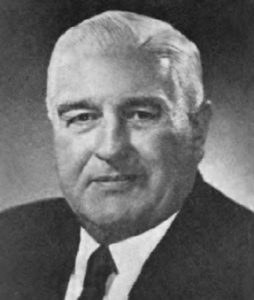 Prior to the creation of the investigative committee, on December 11, 1950, Congressman Philip J. Philbin (D-MA) inserted in the Congressional Record the text of Julius Epstein’s talk delivered earlier in a program on a Polish American radio station in Massachusetts. In it, Epstein described how the management of the Voice of America tried to hide the truth about Katyn, first by broadcasting Soviet propaganda lies about it during World War II with the help of its own pro-Soviet journalists, and after the war by limiting VOA’s coverage of American efforts to investigate the Soviet war crime and generally avoiding reporting on it, this time against the wishes of some of the newly-hired anti-communist refugee broadcasters.
Prior to the creation of the investigative committee, on December 11, 1950, Congressman Philip J. Philbin (D-MA) inserted in the Congressional Record the text of Julius Epstein’s talk delivered earlier in a program on a Polish American radio station in Massachusetts. In it, Epstein described how the management of the Voice of America tried to hide the truth about Katyn, first by broadcasting Soviet propaganda lies about it during World War II with the help of its own pro-Soviet journalists, and after the war by limiting VOA’s coverage of American efforts to investigate the Soviet war crime and generally avoiding reporting on it, this time against the wishes of some of the newly-hired anti-communist refugee broadcasters.
Photo: Rep. Philip J. Philbin (D-MA)
In response to such revelations, Voice of America officials in the State Department denied that they were censoring the Katyn story. They pointed to what was VOA’s extremely minimal coverage until then as proof that there was no such censorship.
For example, a VOA report on October 26, 1950 about the letter of former U.S. Ambassador to Poland Arthur Bliss Lane to Soviet Foreign Minister Andrey Vyshinsky calling on him to provide information about Katyn had only five and a half lines.[ref]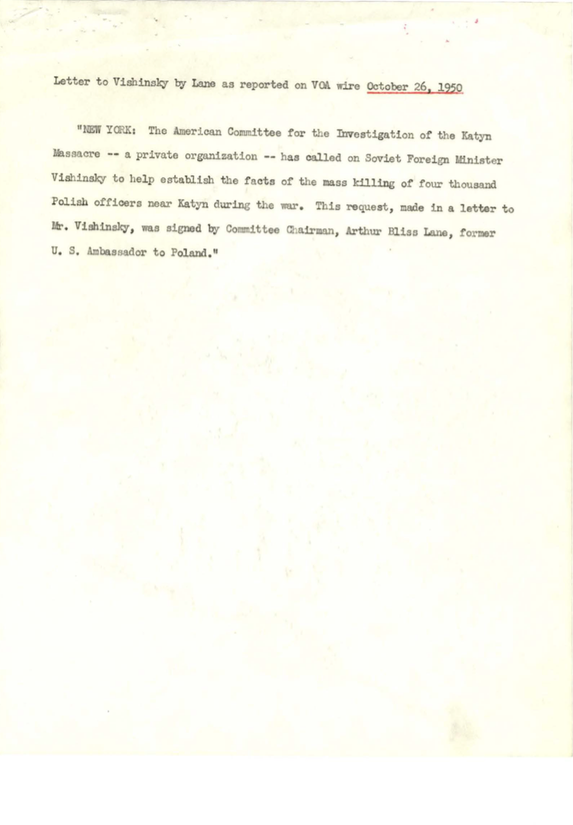 [/ref] This was typical VOA coverage on Katyn in 1949 and 1950 despite tremendous interest in the topic and severe press censorship in Poland, as well as in other countries under Soviet domination, and in Russia itself. Newly-established Radio Free Europe, which had no restrictions on Katyn coverage and much better news service about developments behind the iron curtain, quickly became the most listened to Western radio station in Poland.
[/ref] This was typical VOA coverage on Katyn in 1949 and 1950 despite tremendous interest in the topic and severe press censorship in Poland, as well as in other countries under Soviet domination, and in Russia itself. Newly-established Radio Free Europe, which had no restrictions on Katyn coverage and much better news service about developments behind the iron curtain, quickly became the most listened to Western radio station in Poland.
In an attempt to hide their censorship, VOA officials also falsely claimed that a Polish officer, outstanding writer and artist Józef Czapski, one of the very few survivors of the Katyn murders and the person who had searched for the missing Polish officers in Russia whom Epstein mentioned in the excerpt inserted in the Congressional Record, had voluntarily agreed with the management of the VOA Polish Service to have references to Katyn eliminated from in his 1950 radio talk broadcast by VOA to Poland during his visit in the United States. Czapski was in fact pressured by VOA’s management and was outraged by the censorship. Several years later, he wrote about it in a private letter (1959) to Polish-American scholar Prof. J.K. Zawodny whose in-depth study of the Katyn massacre, Death in the Forest, was published by University of Nortre Dame Press in 1962.[ref]Prof. J.K. Zawodny wrote in his 1962 Katyn study “Death in the Forest”: “Even in the postwar years, after President Roosevelt had died, the war with Japan was over, and the U.N. Charter was already in effect—the policy of suppressing the Katyn case was continued by the State Department. The war was over for several years when Mr. Czapski, the man so activey engaged in searching for the missing men in Russia, and himself a survivor of the annihilation, came to the United States for a visit in the early spring of 1950. The Voice of America invited him to make a broadcast in the Polish language to Poland. From it officials of the Voice of America meticulously eliminated all references to the Katyn Massacre. He was not even allowed to mention the word ‘Katyn’.” (p. 186) In a footnote, Prof. Zawodny cited the 1952 Congressional Record and stated that this information was verified by Mr. Czapski in his letter of December 26, 1959. (p. 196)[/ref]
Epstein wrote in 1952:
“I do not know of any other case which shows so clearly that the policies of the Voice of America have sometimes exactly the same effect as if they had been designed and carried out by a well-paid Soviet agent than the way the Voice treated Stalin’s cold-blooded murder of 15,000 [the figure known at that time] Polish officers who were massacred on Soviet soil in the spring of 1940. As I already mentioned, the OWI accepted Stalin’s big lies on Katyn (that the Germans had murdered the Polish officers) at face value and disseminated those lies all over the world. When, after the war, a large amount of irrefutable evidence became available, evidence to the effect, that not the Germans but Stalin’s own NKVD had massacred the Poles, in order to get rid of the most valuable future anti-Stalinists in Poland, the Voice of America kept silent.”[ref]Epstein, Julius. “The O.W.I. and the Voice of America,” A reprint from the Polish American Journal, Scranton, Pennsylvania, 1952.[/ref]
State Department diplomat and Soviet affairs specialist who was Voice of America director at the time (from October 1949 to September 1952), Foy D. Kohler, denied all the charges made by Epstein and proceeded to tarnish his reputation to contacts outside of the U.S. government. In a memo dated December 18, 1951, which was declassified many years later, Kohler wrote that Mr. Epstein’s activities were “colored with the cast of the disappointed job seeker.” In the same memo, Kohler also suggested that Epstein himself should be investigated.
“Finally, I cannot forbear adding that perhaps the time has arrived to investigate Mr.Epstein himself. His immigration status is not known but it is assumed he has become naturalized since taking out his first papers in 1942. His actions would seem to indicate that he is not be [sic] best type of new American citizen.”
Foy David Kohler (February 15, 1908 – December 23, 1990), was a career Foreign Service Officer and a specialist in Soviet affairs. Despite his condescending attitude toward foreigners as demonstrated by his memo, he apparently performed well as an American diplomat in Moscow. After being nominated in 1962 by President Kennedy to be U.S. Ambassador to the Soviet Union, he served as one of the key liaisons with the Kremlin during the Cuban Missile Crisis and helped to defuse the threat of a nuclear confrontation.
According to a declassified confidential State Department memorandum of January 25, 1951 written by another U.S. diplomat Chester H. Opal who had served in Warsaw after World War II as Information Officer from 1946 to 1949, Charles Thayer who from January 1948 to October 1949 had been the Voice of America director before Foy D. Kohler, was uncertain whether the Russians were the actual perpetrators of the Katyn massacre. In the memorandum addressed to Walter Schwinn who also had served in Poland, Opal noted:
“I should like to recall that Charles Thayer, when he was in Warsaw, stated that he had spent a month of intensive official investigation of the Katyn case and had reported he was not convinced one way or another.”
The evidence of the Russian guilt was, however, overwhelming to any Russia expert who studied the history of Stalinist terror. Apparently, American diplomat and VOA director Charles Thayer found it impossible to believe that Joseph Stalin could have committed such a crime as the murder of thousands of war prisoners.
Chester H. Opal also made a comment in his confidential memorandum pointing to prior VOA censorship of Katyn massacre news reports:
“Further I have the distinct impression that when the Voice of America presented a series on Mikolajczyk’s [Prime Minister of the wartime Polish Government in Exile in London] The Rape of Poland, the one chapter that was omitted — and deliberately — was the one on Katyn.”
This was yet another evidence of VOA’s censorship of the Katyn story in the 1940s. In his book published in the United State in 1948, Mikolajczyk was also highly critical of wartime Voice of America broadcasts in the Office of War Information. It is more than likely that segment was also omitted by VOA.
Mikolajczyk wrote:
“We finally protested to the United States State Department about the tone of OWI broadcasts to Poland. Such broadcasts, which we carefully monitored in London, might well have emanated from Moscow itself.”[ref]Mikolajczyk, Stanislaw. The Rape of Poland: Pattern of Soviet Aggression. New York: McGraw-Hill, 1948. 25[/ref]
“I mentioned also the tone of OWI broadcasts to Poland. They had been following the Communist line consistently, which made our own job more difficult.” 58.
The 1951 formerly classified State Department memorandum also includes an additional handwritten comment on how U.S. diplomats feared the power of U.S. public opinion because it could interfere with their diplomatic activities vis-a-vis the Soviets:
“Walter, I keep thinking that if American Polonia [Polish Americans] ever got the idea that the U.S. government is certain of Russian guilt [for the Katyn massacre], a great uproar would result and people would start demanding that Sec. Acheson take the matter into the UN.”
“You know the Poles…even American Poles,” a State Department diplomat who wrote the note also observed.[ref]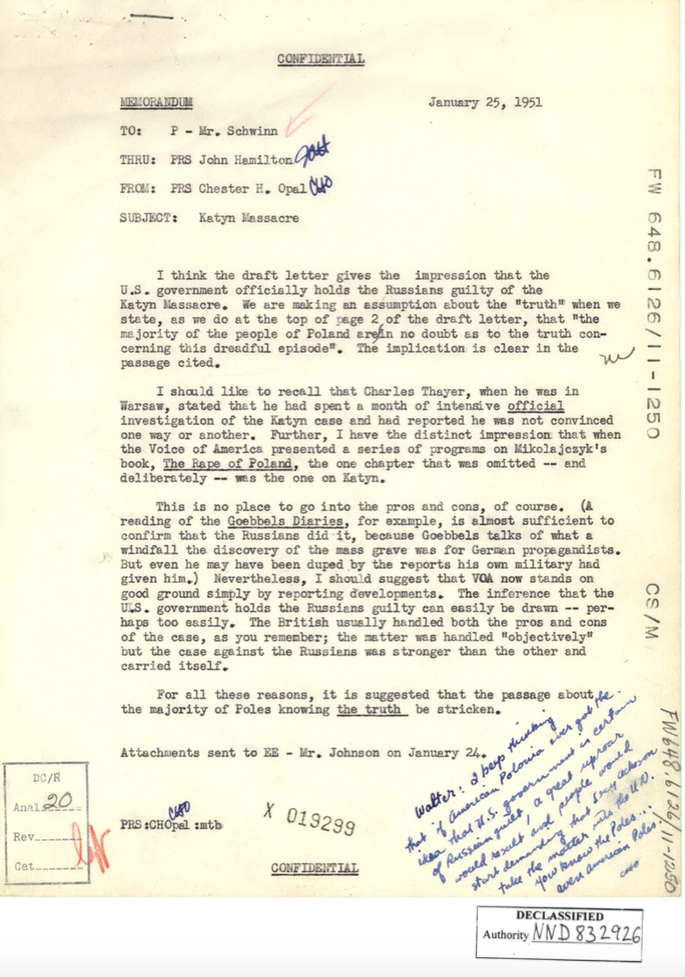 [/ref]
[/ref]
The purpose of the memo was help draft a response to a concerned American citizen, Mrs. James F. Connors of Holyoke, Massachusetts, who had inquired about Voice of America’s coverage of the Katyn massacre. The Voice of America and the State Department wanted her to believe that “Contrary to the impression you have been given, the Voice of America has on many occasions broadcast to other countries, and especially to Poland, news concerning the massacre at Katyn.”
The Chief of Public Liaison for the Secretary of State gave examples of a few Katyn-related reports, listed for her by the Chief of the VOA Polish Desk, and urged her to come to the conclusion that the Voice of America was doing an excellent job of informing radio listeners abroad:
“I believe you will agree that the above record of the Voice of America broadcasts regarding the Katyn massacre indicates that the Voice in this, as in other instances, continues to merit its world-wide reputation as a responsible source of information concerning important issues and events.”[ref]
[/ref]
The statement gave the impression of extensive coverage by VOA when in fact it was rare and almost always minimal. Radio listeners in Poland agreed with the American critics of the Voice of America and offered their own, even more devastating assessments of VOA broadcasts. Speaking to the House of Representatives on July 24, 1951, Congressman Richard B. Wigglesworth (R-MA) read highly critical comments on VOA broadcasts to Poland, which, he said, had been “collected from letters and other messages by Polish writers and newspapermen” and brought to the United States by recent refugees. They described VOA programs as:
“uninteresting, drab, bureaucratic in tone, unconvincing [Emphasis added].”
One of the many critical comments from VOA listeners in Poland in 1951 was:
“They give the impression that they are prepared and spoken by clerks who do their job perfunctorily without any intelligent understanding of the human element or of Polish susceptibilities.” [Emphasis added.]
Despite assertions to the contrary from Voice of America officials, even as late as 1951, VOA still avoided the topic and provided only limited coverage of the congressional investigation of the Katyn murders. On October 27, 1951, the Polish-American Journal published an editorial, “KATYN PROBE AND VOICE OF AMERICA.”[ref]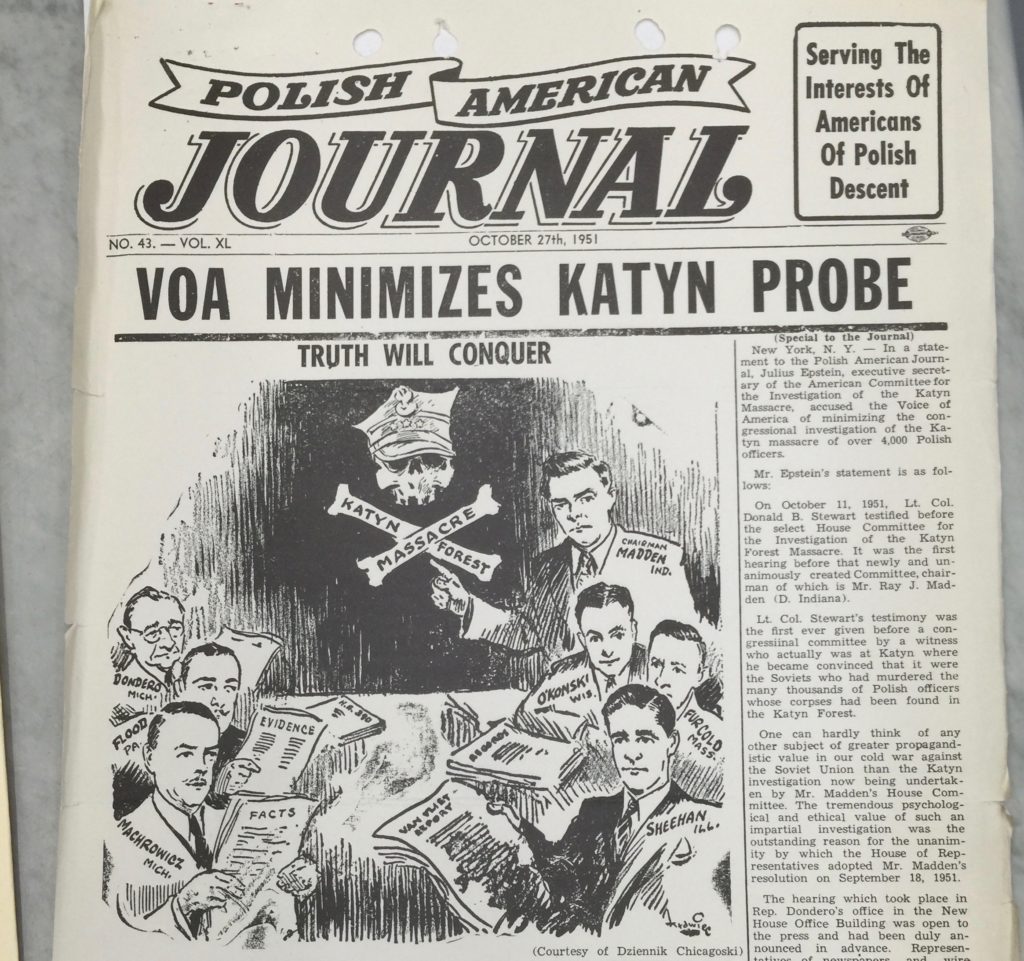 [/ref]
[/ref]
We were shocked to learn from Julius Epstein (see story on page one) of the unexplainable failure of the Voice of America to make proper use of the highly dramatic testimony of Lt. Col. Stewart before the congressional committee regarding the Katyn massacre.
When the House of Representatives unanimously adopted the Katyn resolution of Rep. Madden, its intent was that the Voice of America was to give extensive coverage to this investigation, since it has tremendous propagandistic value in our cold war against the Soviet Union.
The Voice, by devoting only 27 lines to the first Katyn witness to be heard in Congress, is obviously ignoring the intent of Congress.
Such a situation should not be tolerated.
It is important that those in charge of the Voice of America awaken to the necessity of improving itself if we are to successfully compete with the skillful Red propaganda.”
One of the internal memos advised VOA officials to present Julius Epstein as “a disgruntled job-seeker who has proven himself to be an irresponsible promoter, an unscrupulous opportunist and a consistent liar.”
While VOA officials continued to attack his credentials and his character, Epstein’s journalistic activities eventually led to significant reforms. He and others helped to convince members of Congress to launch in 1951 a bipartisan investigation of the Katyn massacre by a select committee of the House of Representatives. The bipartisan committee concluded in 1952 that the Soviets were without any doubt responsible for the Katyn murders. The congressional committee also revealed that the Voice of America indeed had lied about Katyn during World War II and later “had failed to fully utilize available information concerning the Katyn massacre until the creation of this committee in 1951.” Julius Epstein was proven to be right.
Repeated criticism in Congress from both Republicans and Democrats forced the management of the Voice of America and other officials in the State Department to allow more detailed and more frequent reporting about Katyn. There was a substantially greater number of such VOA reports in 1952 as compared to 1951. Some of the programs in late 1951 and in 1952 also included much stronger criticism of the Soviet Union than in earlier years, but still none pointed out the complicity of the Roosevelt administration and the Voice of America in the previous cover-up of the evidence of Stalin’s guilt and restricting VOA coverage about Katyn.
In addition to revealing how the United States propaganda outlet broadcast Soviet lies about Katyn without any challenge, the bipartisan congressional investigation also highlighted evidence of illegal censorship of U.S. domestic media during the war by officials who were then in charge of the agency running the Voice of America and their attempts to influence American media and public opinion with false and misleading information about the Soviet Union. One of OWI officials who tried to censor American media was future U.S. Senator Alan Cranston (D-CA).
The so called Madden Committee, named after its Democratic Chairman, Rep. Ray J. Madden of Indiana, also expressed its bipartisan view that “if the Voice of America is to justify its existence it must utilize material made available more forcefully and effectively.”[ref]”The Katyn Forest Massacre: Final Report.” Select Committee to Conduct Investigation and Study of the Facts, Evidence, and Circumstances of the Katyn Forest Massacre. United States Government Printing Office: 1952, 12.[/ref]
Epstein’s criticism and his public activities also resulted later in the 1950s in an increase in VOA coverage of other Soviet violations of human rights.
However, limited censorship of Katyn-related news resumed at the Voice of America at various points in later years of the Cold War, especially during the Nixon-Ford policy of detente toward the Soviet Union. Such censorship was eliminated altogether only after personnel and programming reforms initiated by the Reagan administration in 1981. These Reagan-era reforms were initially strongly resisted by longtime VOA managers although many were eventually replaced by the new administration. Later, some of those managers who were moved into less responsible positions continued to bemoan “the difficult winter of 1981/1982.”[ref]Alan L. Heil, Jr., who had worked for the Voice of America from 1962 until he retired in 1998, wrote in his Voice of America: A History: “Hollywood’s celebrated film producer John Houseman, who, as head of the overseas radio production section of the Office of War Information, could be considered the first VOA director, came back for its fortieth-anniversary celebration on February 24 [1982]. He reminded the packed auditorium that honest reporting had been the key to the Voice’s credibility when the tide turned in the direction of an Allied victory at the end of World War II. That underlying theme sustained VOA through the difficult winter of 1981/1982.” Heil, Alan L. Jr. Voice of America: A History. New York: Columbia University Press Publishers, 2003. (Heil 208). It was exactly toward the end of World War II, when pro-Soviet propagandists working for VOA were most active in defending Stalin, covering up his crimes, ignoring anti-Nazi, anti-communist democratic movements in Eastern Europe and helping him impose communist governments in the region.[/ref]
They also continued to laud VOA’s first director, Hollywood actor John Houseman, as the paragon of objective journalism despite his own references to VOA as a propaganda tool and his pro-Soviet bias. Houseman turned out to be too leftist even for the Roosevelt White House. The State Department secretly accused him in a memo to the White House of hiring Communists to prepare Voice of America radio broadcasts. In 1943, the State Department refused to give him a U.S. passport for official travel abroad after a scandalous pro-communist VOA broadcast to Italy. After this, he resigned.
Both Houseman and Epstein were Jewish immigrants in the United States. Epstein was a political refugee who had fled Europe after the rise of Hitler. Houseman, whose nationality was half British and half French, was a businessman, a theatre producer, play director and actor who at one point was an illegal alien. Epstein was an seasoned journalist. Of the two, Epstein was by far wiser and far more worthy of praise and remembrance.
Unfortunately, Houseman, a pro-Stalin propagandist during World War II, is still being lauded by some as a positive figure in the history of the Voice of America and a defender of truthful journalism. There is no evidence other than his own statements that he was.
Julius Epstein and other post-war anti-communist VOA journalists, such Zofia Korbonska who was hired after escaping from Poland in 1947, are now almost completely forgotten Cold War figures in the United States. They are, however, the ones who truly deserve more recognition and a new, true history of the Voice of America to be written to show their unquestionably enormous contributions in their VOA work in later years of the Cold War to the defeat of communism in Eastern Europe and in the Soviet Union. Even greater credit goes to journalists and managers of Radio Free Europe and Radio Liberty, who, unlike the management of the Voice of America, never engaged in any censorship of the Katyn massacre story. In 1984, Józef Czapski was interviewed by VOA’s Polish Service but did not discuss the censorship of his 1950 VOA broadcast.

UNITED STATES OF AMERICA
Congressional Record
PROCEEDINGS AND DEBATES OF THE 81st CONGRESS
SECOND SESSION
Appendix
VOLUME 96—PART 18
SEPTEMBER 23, 1950, TO JANUARY 2, 1951
(PAGES A6879 TO A8014)
UNITED STATES GOVERNMENT PRINTING OFFICE, WASHINGTON, 1950
[Page A7601]
Justice for Poland
EXTENSION OF REMARKS
OF
HON. PHILIP J. PHILBIN
OF MASSACHUSETTS
IN THE HOUSE OF REPRESENTATIVES
Monday, December 11, 1950
Mr. PHILBIN. Mr. Speaker, under unanimous consent to revise and extend my remarks in the RECORD, I include therein a speech by Mr. Julius Epstein, secretary of the American Committee for Investigating the Katyn Massacre.
This speech was recently delivered on the Justice for Poland radio program, which is sponsored by the Western Massachusetts Branch of the Polish-American Conference. It is a vigorous, forth- right statement, which should commend itself to the entire American people.
KATYN AND THE VOICE OF AMERICA
In 1943, I was working as editor for the Office of War Information. Among my duties was the reading of the Nazi press. One day I came across an issue of the Volkischer Beobachter, Hitler’s own newspaper. In that issue, a protocol was published, signed by 12 international scientists at Smolensk, U. S. S. R., stating that the Polish officers whose bodies had been found by the German Army in the woods near Katyn, had been murdered by the Soviets in spring, 1940. The scientists’ protocol enumerated all the reasons which had led the members of the commission to this conclusion.
I was immediately struck by this protocol. Although I was well aware that this protocol was published by Hitler’s and Goebbels’ newspaper Der Volkischer Beobachter, a newspaper, which besides Stalin’s Pravda and Izvestia, of course, had probably carried more lies than any other newspaper in the world, I immediately had the impression that this time Goebbels was not lying, simply because the truth was on his side.
Had not the Polish Government in exile in London asked the International Red Gross for an investigation on the spot? And did not the German Government declare that it was willing to allow such an investigation? And was not the only reason that such an impartial investigation did not come to pass, the fact that Stalin did not permit the International Red Cross to carry out such an investigation? Was it not clear that Stalin would have welcomed such an inveitigation if he were innocent? Those were the thoughts which convinced me me in a few minutes that the protocol printed in the Volkischer Beobachter told the truth about the massacre of Katyn. There were outstanding scholars among the members of the commission, among them Professor Naville of the University of Geneva, a Swiss, and therefore, a citizen of the neutral nation in World War II.
From that moment on, I have never lost my interest in Katyn. I read all books, articles, pamphlets I could lay my hands on regarding this subject. I studied the memoirs by diplomats and statesmen like Jan Ciechanowski, former Polish Ambassador in Washington; Stanislaw Mikolajczyk, Prime Minister and Vice Premier of Polish Governments in London and Warsaw; Arthur Bliss Lane, our former American Ambassador to Poland, and many others. I studied the Polish memoranda about Katyn, but also those made public by the Germans and the Soviets. When I thought I knew enough, I decided to write an article on Katyn. Since it was my idea that an American committee for the investigation of the crime should be formed, I wrote to some of the members of the so-called European Medical Commission who investigated the crime on the spot and whose protocol I had read in the Volkischer Beobachter. I asked them three questions: Whether there was any pressure by the Germans before during, or after the in investigation; whether they still believed in the Russian guilt; and whether they would be willing to appear before an American committee and testify in public. I got some very encouraging answers from some of the members of the medical commission. They wrote me that there was not the slightest pressure from the German side, neither before, nor during or after the investigation, that they still believed in the Russian guilt, and that they were willing to come to the United States as soon as they were invited.
This was good news, indeed. I mentioned this correspondence in my article at the end of which I suggested that an American committee should be formed for the investigation of the crime.
As you know, this committee has been formed under the presidency of our former Ambassador to Poland, the Honorable Arthur Bliss Lane, author of the outstanding book, I Saw Poland Betrayed. The committee made its debut at the Waldorf-Astoria on November 21, 1949. There, Ambassador Lane delivered a speech about Katyn and the formation of the committee and Max Eastman who was presiding at the preis conference read Mr. Lane’s letter to the Soviet Foreign Minister, Andrei Vishinsky. Mr, Lane’s speech as well as his letter to Vishinsky are documents of great value. The world press in this hemisphere, as well as in Europe and other parts of the world, treated them as such, and many newspapers and periodicals printed the full text of both documents. However, the Voice of America, the propaganda and advertising agency of our own State Department, did not care to broadcast either Mr. Lane’s speech or his letter to Vishinsky. It was neither the first nor the last time that the Voice of America refused to broadcast the truth about Katyn.
Let me tell you more about it.
It was on February 10, 1949, that I first offered a script about Katyn to the Voice of America. It took the Voice about 10 weeks to answer my offer. At last, on April 20, Mr. Charles W. Thayer, then head of the New York offices of the Voice, answered my letter. He bluntly rejected my offer with one sentence. He wrote, and I quote: “We have decided against making use of the material at this time.” That was all. No reasons were given, no explanations advanced, why the Voice did not want to avail itself of the tremendous material gathered in a long and thorough research. The material I had offered to the Voice contained many facts never made public before.
About 7 months later, when I made preparations for the press conference of the American Committee for the Investigation of the Katyn Massacre, Inc., I again approached the Voice. As I mentioned before, the Voice of America did not care to make any use of the two documents made public by Mr. Lane. Some of the language editors, however, expressed personally their regret that they were not allowed to broadcast Mr. Lane’s speech and his letter to Vishinsky. As they told me, they did not get the green light from Washington to broadcast those documents. Again, we were completely at a loss to understand the Government’s attitude, for which no valid reasons were given. And what reasons could they have given for not broadcasting Mr. Lane’s speech and his letter to Vishinsky, for not broadcasting these great documents at least to their most interested audiences, the Poles, the Russians, and the Germans?
In the spring of 1950 Count Joseph Czapski arrived in the United States. Count Czapski is well known not only among the Poles. He is a writer and painter, and he is also a survivor of the massacre of Polish officers on Russian soil. He has widely written about Katyn and his own experiences to General Anders’ representatives in the Soviet Union. The Voice of America, well aware of Czapski’s importance, invited him to address his Polish compatriots. Count Czapski was anxioas to get the truth aboul Katyn across the iron curtain. But who can describe his disappointmenl when he was told in the New York offices of the Voice that he couldn’t even mention the word Katyn? I had the privilege of having luncheon with Count Czapski an hour or so after his conversation with Voice officials. I shall never forget how furious he was. I could not comfort him. The only thing I could do, was to tell him about my own experience with the Voice in connection with the Katyn massacre.
To evaluate correctly the very strange behavior of the Voice in respect to Katyn w should never forget that the only thing broadcast by our Government were Stalin’s lies of 1943 and 1944.
It is an undeniable fact that our Government has never told the truth about Katyn. From 1943, when the story broke, up to this very day when the cold war against Stalin has already become pretty hot in Korea, the Voice of America is suppressing the truth. Wouldn’t it be about time to break this habit?
It may, therefore, be a good idea if you, my listeners of today, wrote short letters of protest against the suppression of the truth on Katyn by our Voice of America. The letters should be addressed to thfe Sec retary of State, Mr. Dean Acheson, Department of State, Washington, D.C.
Your letters may do some good. They may even change the attitude of the Voice of America.
Whatever the success of your letters may be, the truth will become known as always truth prevails against lies. No government in all the world is powers enough to kill the truth. The real Voice of America, people’s voice, will carry the trutn Katyn around the world.
Wikipedia and Other Sources
Julius Epstein (author) (1901–1975)

Julius Epstein, author, scholar, and journalist, was born on December 26, 1901, Vienna, Austria. At one point he listed his religion as Protestant, but he had also Jewish roots and therefore would have been a victim of Nazi persecution had he stayed in Germany. He was the son of Alice Epstein-Strauss and grandson of Adele Strauss, the third wife of composer Johann Strauss II.
Epstein attended grammar school and high school in Vienna and Had Berka near Weimar, Germany, and Jem, Thuringia, Germany. He studied economics, journalism and sociology at the universities of Jena and Leipzig.
From 1921, he engaged in journalistic activities. In the spring of 1922, he went as correspondent for German, Austrian and Mexican newspapers and periodicals to Italy to attend the conference of Genoa.
In the summer of 1923, he became a member of the German Communist Party and Chairman of the Communist students’ group at the University of Jena, but he left the party in December 1923 and became a lifelong anti-communist.
From 1924 to 1933, he worked as a free-lance journalist and foreign correspondent in Germany. He was contributor to many newspapers and periodicals, among them: “Berliner Tageblatt,””Hamburger Echo,” “Neue Zeitung,” Leipzig; “Prager Tagblatt,”, Prague; “Pariser Tageszeitung,” Paris; “Revue Internationale de L’Enfant,” Geneva; and others.
After Hitler’s advent to power, he left Germany as a refugee on March 17, 1933 and went to Prague where he worked as a writer and foreign correspondent for Swiss, Swedish, Dutch and French newspapers and periodicals. He also contributed to many democratic and anti-Hitler newspapers and weeklies in Czechoslovakia. In September 1938 during the so-called Munich crisis, he left Prague with his wife and son and went to Switzerland where I obtained an American visa.
On March 9, 1933, he arrived with his family in New York and started to write for the New York progressive weekly “The New Leader.” He also continued to work as a foreign correspondent for Swiss newspapers. During that time, he met General Walter Krivitzky, the former chief of the Soviet Military Espionage in Western Europe who had just abandoned Stalin’s cause. Krivitzky exposed in a series of articles, which later appeared as a book, Stalin’s true nature and his real aims and predicted already in April 1939 the Stalin-Hitler Alliance of September 1939. Epstein arranged for the publication of Krivitzky’s book by a German refugee publisher in Amsterdam.
From March 1942 to December 1944, Epstein worked as Language Editor in the New York offices of the Office of War Information (O.W.I.) which were the offices of what became later known as the Voice of America. During that time he had to wage a continous struggle against what he described as “the many communists and fellow travelers on the O.W.I.’s pay roll.” He later wrote that “proof of that fight can still be found in the memoranda I wrote while working for the O.W.I.” Part of his duties was to read the Nazi press and to prepare English-language summaries for the use by O.W.I. officials. It was then that he read the report by the twelve international scientists who went to Katyn in 1943 after the Germans dicovered the mass graves.
He left the O.W.I. in 1944 under a “reduction in force” administrative order despite having always received “excellent” job performance ratings. VOA officials accused him later in internal memos of unspecified behavior in violation of security rules. A declassified December 18, 1951 memo from VOA director Foy D. Kohler referred to Epstein’s alleged “certain unreliable associations of his.” Ironically, the O.W.I. could have used his brief membership in the German Communist Party to get rid of him in 1944 for his criticism of communist propaganda in VOA programs, but there is no evidence what exactly led to his dismissal.
After leaving the O.W.I. in 1944, Epstein went back to his journalistic work and continued to collect all available material on Katyn.
In July 1949, he published two articles on Katyn in the New York Herald Tribune. These articles ultimately led to the formation of the American Committee for the Investigation of the Katyn Massacre, Inc. under the presidency of former U.S. Ambassador to Poland Arthur Bliss Lane. Epstein became Executive Secretary of the committee and worked in this capacity under the guidance of Ambassador Lane.
In 1962, during the height of the Cold War, Epstein alleged that the Soviet Union had lost at least a dozen cosmonauts in unreported accidents. He claimed the deaths were known to the U.S. government which did not want to embarrass the Russians by revealing such information. He called on the U.S. government to disclose its knowledge of Soviet space losses.
In 1963, he received an appointment to the Hoover Institution as an assistant to Dr. Stefan Thomas Possony, an Austrian-born U.S. economist and military strategist who is credited with influencing Ronald Reagan to start the space-based Strategic Defense Initiative.
In 1973, Epstein published his book Operation Keelhaul which described how the Roosevelt administration made a secret deal with Stalin to return four million Soviet citizens in Western Europe, not only those who collaborated with Hitler but also POWs, civilians captured by the Germans and White Russians. Most of them received lengthy prison or Gulag sentences and many were executed. Soviet Nobel Prize winning author Alexandr Solzhenitsyn described it as “the last secret of World War II.” Epstein had to sue the U.S. government to get some of the “Operation Keelhaul” files declassified and released. He died in Palo Alto, California in 1975.
Biographical Directory of the United States Congress
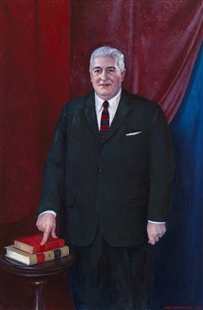 PHILBIN, Philip Joseph, (1898 – 1972)
PHILBIN, Philip Joseph, (1898 – 1972)
Philip Joseph Philbin, a Democratic Representative from Massachusetts, was born in Clinton, Worcester County, Mass. on May 29, 1898
He attended the public schools and during the First World War served as a seaman in the United States Navy 1917-1919.
He graduated from Harvard University in 1920 and from Columbia University Law School, New York City, in 1924. He was admitted to the bar the same year and commenced practice in Boston, Mass., and later in Clinton, Mass. He also engaged in the realty and fuel businesses and in agricultural pursuits.
Philbin was secretary, campaign manager, and personal representative at intervals for Senator David I. Walsh 1921-1940, special counsel for the United States Senate Committee on Education and Labor 1934-1936, referee in the United States Department of Labor in 1936 and 1937 and member of the advisory board of the Massachusetts Unemployment Compensation Commission 1937-1940.
In 1935, he became chairman of the town of Clinton Finance Committee and in 1942 was elected as a Democrat to the Seventy-eighth and to the thirteen succeeding Congresses (January 3, 1943-January 3, 1971). He served as chairman of the Committee on Armed Services (Ninety-first Congress). He was unsuccessful as a candidate for renomination in 1970 to the Ninety-second Congress. He died at his home, Philcrest Farms, Bolton, Mass. on June 14, 1972.
Julius Epstein Letter in the Washington
Evening Star Regarding the Voice of
America
EXTENSION OF REMARKS
OF
HON. GEORGE A. SMATHERS
OF FLORIDA
IN THE HOUSE OP REPRESENTATIVES
Thursday, August 24, 1950
[Page A6083]
Mr. SMATHERS. Mr. Speaker, in the Appendix of the CONGRESSIONAL RECORD on page A5744, there was inserted by the distinguished Congressman from Michigan [Mr. DONDERO] a letter written by Mr.Julius Epstein in which letter Mr. Epstein charged the Voice of America with having not explained properly the Katyn massacre and at the same time there appeared in the letter a more serious charge wherein Mr. Epstein was alleged to have been told that the reason a certain position was not taken was that “it would create too much hatred of Stalin among the Poles.”
A short time after Mr. Epstein’s letter was inserted in the RECORD, Mr. Edward W. Barrett, Assistant Secretary of State in charge of the Voice of America and other International Information and Educational Exchange Programs, appeared before a subcommittee of which I am chairman. Mr. Barrett was questioned about Mr. Epstein’s charges. We advised Mr. Barrett that the charges made by Mr. Epstein were of such a serious nature that we felt that some explanation should be forthcoming.
I recently received a copy of a letter dated August 16, addressed by Mr. Barrett to Mr. DONDERO, and attached to that letter was a memorandum prepared by Mr. Charles M. Hulten, general manager of the International Information and Educational Exchange Programs, explaining the Epstein charges. In order that the record may be straight on this matter I ask unanimous consent to insert herewith a copy of the letter Mr. Barrett addressed to Mr. DONDERO and a copy of the memorandum prepared by Mr. Hulten on this same subject:
WASHINGTON, August 16, 1950.
Hon. GEORGE A. DONDERO,
House of Representatives.
DEAR MR. DONDERO: In the CONGRESSIONAL RECORD of August 9, 1950, on page A5744, you had inserted the letter by Julius Epstein appearing 2 days earlier in the columns of the Evening Star of Washington.
Because of the serious nature of the charges made by Mr. Epstein, I have had a complete and thorough investigation made to determine whether they have any factual basis to support them. I am sure that you will want to have the results of that investigation, which are contained in the attached memorandum to me from Charles M. Hulten, general manager, International Information and Educational and Educational Exchange Programs.
Several other Members of Congress have inquired about the Epstein letter and I am furnishing them with copies of this letter and of the memorandum.
It is the policy of the Department to investigate thoroughly any serious criticisms of this nature. I would appreciate it if you would be so good as to let me know of any which you receive so that I can look into them.
Sincerely yours,
EDWARD W. BARRETT,
Assistant Secretary.
Enclosure, from Mr. Hulten, dated August 16, 1950.
MEMORANDUM
AUGUST 16, 1950.
To: Mr. Edward W. Barrett.
From: Charles M. Hulten.
Subject: Julius Epstein letter in the Washington Star re the Voice of America.
At your instruction I have made a thorough investigation of the charges appearing in the letter of Julius Epstein to the Washington Evening Star, August 7. This letter was placed in the CONGRESSIONAL RECORD 2 days days later by Congressman Dondero of Michigan.
Mr. Epstein’s first allegation was that Count Joseph Czapski was advised to omit any mention of Katyn from the draft which he submitted to the New York office of our broadcasting division. The facts concerning this incident are that when Mr. Czapski came to the United States last January, he visited Mr. Gidynski, the Chief of the Polish Desk of the Voice of America, and suggested that excerpts from his book, which had been published in Polish and French under the title “The Inhuman Land” and an English edition of which was to appear this winter, be broadcast to Poland. Mr. Gidynski explained to him that lack of air time precluded use of this book in its entirety, but that he would be willing to prepare a series of five scripts on his volume. As an act of courtesy to the author, Mr. Gidynski suggested that he personally write the first script, explaining the title of his book in terms of his experitoces described in it. Mr. Czapski asked Mr. Gidynski about our attitude toward Katyn and was told that the Voice of America played every hard news item about Katyn; for example, the news of the formation of the American Committee for the Investigation of the Katyn Massacre, and | the deposition by Judge Gunther before one of the congressional committees. Mr. Czapski inserted a few sentences about Katyn into his script. Mr. Gidynski eliminated them with the consent of Mr. Czapski on the ground that it would not be wise to deal with so serious a subject as the Katyn massacre in a few brief sentences. The series of reviews of Mr. Czapski’s book was broadcast on the following dates: May 24, 27, 29, 30, and June 14, 1950. All scripts were read by regular Voice of America staff announcers.
The second allegation by Mr. Epstein was that the Voice of America refused to broadcast certain material prepared for the American Committee for the Investigation of the Katyn Masscre, Inc., for which Mr. Epstein acted as publicity man. He alleges that he was told it would create too much hatred of Stalin among the Poles.
It is a fact that Mr. Epstein talked with several officers of the Department and urged them to give extensive coverage to a press conference announcing the formation of the above-named committee. The best evidence of what Mr. Epstein was told at that time is contained in a letter, dated November 14, 1949, from Foy D. Kohler, Chief of our International Broadcasting Division. This letter follows in its entirety:
“DEAR MR. EPSTEIN: This will acknowledge the receipt officially of your recent letters addressed to Mr. Lehrbas of OII (Office of International Information), as well as to a number of individual members of IBD (International Broadcasting Division) including myself with regard to the press conference to be held by the Honorable Arthur Bliss Lane on Monday, November 21 at 4 p. m. at the Waldorf Astoria.
“As you were informed in our conversation on Wednesday last, the Voice of America will be glad to have a representative at this press conference and appreciates your invitation. However, as we also pointed out in our conversation, the usefulness of the work of the proposed committee to the Voice will depend largely on the seriousness and objectivity of its approach to the Katyn investigation and to the production thereby of new factual information and hard news.”
In other words, Mr. Epstein was told that the Voice of America was prepared to carry any material developed by the committee as a result of its investigation. We refused to permit Mr. Epstein to say in his press release that the Voice of America was carrying anything specific about the press conference, just as we avoid advance commitments on all press conferences. A member of the VOA News Desk did cover the conference. The coverage given to that event in our broadcasts was roughly commensurate with that of the New York Times and the Herald Tribune. When Mr. Epstein called later to ask why more attention was not
given to the story, he was told again that we were prepared factually to cover material developed by the committee. The memorandum on file indicates that he was ill-tempered and rude because we had not gone all out to help him in his promotional activities. The correctness of the decision by our editors may be judged from the fact that the investigation promised at the press conference was never carried out.
The Voice of America has had a consistent policy that when it tackles such serious matters as the Katyn massacre it does so with well marshalled facts and not in a flashy, superficial way. We would have been in a serious position had we made a great play of the formation of the committee and then had been unable to follow up with anything substantial to add to what had already been known about Katyn.
A careful checking of persons who talked to Mr. Epstein would lead me to believe that his quotation about causing “hatred of Stalin” is an unmitigated falsehood. Mr.Kohler’s letter cites the reason given Mr. Epstein for our decision.
Mr. Epstein makes still another point. He asserts that there are too many of the employees of the Office of War Information still with the Voice of America and that this has led to a distortion of its output. Our records show that Mr. Epstein was employed by OWI as a German language editor from August 1942 to December 1944. At that time he was involuntarily separated from that organization by reason of a “reduction in force.” Since that time Mr. Epstein has sought reemployment with our broadcasting division. His letter-writing attacks on the Voice include a letter in the New York Times of March 14, 1949, and another in the Washington Post on November 3, 1949.
As for the VOA personnel, Mr. Epstein’s employment history is illustrative of the amount of screening, weeding out, and careful selection that has gone on. For example, a total of 849 wartime information employees were transferred to the Department in 1946 to conduct all phases of its international broadcasting operations; but as a result of various cutbacks, normal turnover, and new recruitment, there were only 134 of these employees among the total of 619 persons on the payroll of the International Broadcasting Division as of June 1950.
You will remember that, because of an appropriation cut, the entire International Broadcasting staff was reduced in March 1948 to 234 employees. The cutback was made only after the most careful screening process. All employees retained, and all who have been hired for the expanded operation since, have been subjected to full field investigations by the FBI, as required by section 1001 of Public Law 402, under which we operate. Our present staff is one which has been selected with extraordinary care. It represents the only collection of trained, experienced, professional international broadcasters in the United States, except for a small group working with the World Wide Broadcasting Foundation in Boston.
Voice of America: Is It Effective?
EXTENSION OP REMARKS
OF
HON. GEORGE A. DONDERO
OF MICHIGAN
IN THE HOUSE OF REPRESENTATIVES
Wednesday, August 9, 1950
Mr. DONDERO. Mr. Speaker, under leave granted by the House to extend my remarks, I include therein the statement appearing in the Evening Star of Washington for August 7, 1950, by Julius Epstein.
It is difficult to believe that the Voice of America withholds facts because they might be offensive to Russia, but such is the contents of the article I am inserting herewith, by one who knows something of the subject:
SOFT-SPEAKING VOICE
I want to express my gratitude to The Star for David Lawrence’s column of July 18, on the ineffectiveness of our psychological warfare.
Mr. Lawrence is certainly dead right when he states that the absolute incompetence of our Voice of America cannot be explained by lack of funds. I agree completely with him when he says: “But the truth is that even if $100,000,000 is appropriated, it would be ineffective if our Government fails to express itself forthrightly in the propaganda field.” I want to contribute a recent example of what he is talking about.
A few weeks ago, Count Joseph Czapski visited the United States. He is not only a great Polish writer and a good painter, but also one of the very few survivors of the mass slaughter of more than 15,000 Polish officers during World War II on Russian soil. He was invited to address the Polish people through our Voice of America. When he submitted the draft of his speech to the New York office of the Voice, he was advised to omit any mention of Katyn, where many of the Polish officers had been slain.
This fits perfectly the answer I was given by high officials of the Voice and the State Department when I inquired some months ago, why the Voice did not broadcast the speech delivered bv our former ambassador to Poland, Arthur Bliss Lane, and his letter to Russian Foreign Minister Vishinsky, both issued at the occasion of the formation of the American Committee for the Investigation of the Katyn Massacre, Inc. Those gentlemen told me: “It would create too much hatred of Stalin among the Poles.”
I asked the gentlemen of the Voice: “What do you want to create among the Poles? Love for Stalin, at the expense of the American taxpayer?” There was no answer to this question
There are still too many of the old OWI (Office of War Information) employees working for the Voice, both in this country and overseas. I mean those writers, translators and broadcasters who so wholeheartedly and enthusiastically tried for many years to create “love for Stalin,” when this was the official policy of our ill-advised wartime Government and of our military government in Germany. There is no doubt that all those employees were at that time deeply convinced
of the absolute correctness of that pro-Stalinist propaganda. How can we expect them to do the exact opposite now?
Even if they try to do the impossible—they certainly do not want to lose their well-paid jobs—they cannot change their skin and speak with the same power of persuasion against the bloody monster in the Kremlin as they spoke for so many years in its favor, when they ardently tried to sell the story of our “gallant ally,” the “democratic and peace-loving Stalin.”
As long as the officials of our Voice of America are afraid “to create hatred against Stalin,” the real embodiment of evil on earth, and as long as those old friends of Stalin, now in the disguise of weak anti-Stalinists, are allowed to run the show, no good can come from it and the money spent on that enterprise is wasted.
DECLASSIFIED Authority NND 5 0894
AMERICAN COMMITTEE FOR THE INVESTIGATION OF THE KATTN MASSACRE, INC
470 Fourth Avenue
Suite 1209
New York 16, New York
Murray Hill 6-4488
November 30, 1951
Mr. Ben Hibs
SATURDAY EVENING POST
Independence Square
Philadelphia, Pa.
Dear Mr. Hibs:
I thank you very much for your letter of November 28.
I am glad that you sent the reprint to Mr. Foy Kohler and that you asked him to investigate the complaint.
However, since Mr. Kohler is the director of the New York offices of the Voice of America and since the failure to cover the Stewart hearing was due to the mess
in the Washington offices, don’t you think it would be appropriate to call Mr. Barrett’s attention to that case?
I’m enclosing another reprint which you might pass along to the Assistant Secretary of State, Mr. Edward W. Barrett.
Based on personal experience, I want to warn you against overoptimism as far as investigations of the Voice by the Voice are concerned. As Fulton Lewis, Jr. pointed out in recent colums, those investigations are always end up in covering up the real issue and in issuing some “excuses” and “explanations”
which are neither excuses nor explanations. I know of dozens of examples to illustrate this point.
Since the facts as given in my statement are established beyond the shadow of any doubt, wouldn’t it be possible that your Advisory Commission simply take some direct steps to establish the identities of those responsible for the failure in this case?
With the expression of the gratitude of this committee,
I remain very sincerely yours,
Julius Epstein, Executive Secretary
American Committee for the Investigation of the Katyn Massacre, Inc.
Enc.
UNITED STATES OF AMERICA
Congressional Record
PROCEEDINGS AND DEBATES OF THE 82d CONGRESS
SECOND SESSION
VOLUME 98—PART 4
APRIL 23, 1952, TO MAY 20, 1952 (PAGES 4241 TO 5602)
UNITED STATES GOVERNMENT PRINTING OFFICE, WASHINGTON, 1952
POLAND AND HUMAN-LIBERTY
Mr. PHILBIN. Mr. Speaker, it has been my custom since I have been a Member of this body on the anniversary of Poland’s Constitution Day to join other Members of the House in commemorating that great event in world history.
I think that Poland’s Constitution Day has new significance this year, because already there are signs that the indomitable Polish people and other people similarly oppressed in Western [sic] Europe and in other parts of the world are at last, after many years of persecution and suffering, prepared to move in order to throw off the shackles that so cruelly bind them.
There is another reason this year why those of us dedicated to democratic principles of self-determination and justice should make special efforts to keep the great issues of human freedom alive in diplomatic and political circles and that is the current investigation of the outrageous massacre at Katyn.
Since this frightful mass slaughter occurred the world was led to believe that the Germans were responsible for it. Even the publicity agencies of our own Government, such as OWI and the Voice of America, either by their silence or by implication, have given the impression that the Germans perpetrated this horrible and indescribable blood bath. It is interesting for me to note that even though the OWI and later the Voice of America had, or should have had, access to the facts of this cold-blooded slaughter of 15,000 loyal Polish officers, who were massacred on Soviet soil in the spring of 1940, the evidence unhappily shows that these agencies apparently accepted the Russian version of the horrible incident, namely, that it had been perpetrated by the Germans.
All the more distressing is that after the war, when a large number of undeniable facts became available indicating that it was not the Germans, but the Russians, who massacred the Poles, the Voice of America kept silent. This silence was all the more difficult to understand in the light of the fact that that agency had available to it complete evidence in the Katyn case as assembled by a well-known writer for the New York Herald Tribune. Not only did the Voice of America fail to publish or broadcast this evidence, but it failed to protect the efforts of public-spirited citizens and good American patriots, some of them former high officials of the Government, to try to bring out the facts. Despite the fact that there was intense interest in it all over Europe, where front-page feature stories appeared in the European press concerning the incident, our own foreign publicity and propaganda agencies were as silent as the tomb.
Are we to assume, according to the views of the writer mentioned above, that the Voice therefore decided to play down Katyn because it would create too much hatred against Stalin among the Poles. It is indeed appropriate to ask, as he has, whether anyone connected with this Government desires to create love for Stalin among the Poles at the American taxpayer’s expense.
Moreover, it should be noted that the Voice censored the speech of Count Joseph Czapski, one of the few survivors of Katyn, when he was permitted to address the Polish people through the facilities of the Voice. He was not permitted to mention the mere word of Katyn. I am at a complete loss to understand such a policy. Why was it pursued?
If we are interested In helping the Polish people to liberate themselves from oppression, why was the truth about Katyn suppressed for more than 8 years? Why did the officials of this Government consider it proper to tell the truth about Katyn in May 1951 when the same truth was unfit to be produced in
1949 and 1950, not to speak of the years before that?
Now that a House committee, under the leadership of our esteemed colleague from Indiana [Mr. MADDEN] is currently investigating all aspects of the Katyn massacre, we may at least expect to get the full truth as it is available from witnesses and documentary evidence.
In order to document the foregoing remarks that I have made in behalf of Poland and especially my references to Katyn, I desire to set forth in the RECORD a portion of an article entitled “The OWI and the Voice of America.” by Julius Epstein, experienced foreign correspondent, former language editor of the OWI and a well-known newspaperman.
It is very difficult for me to understand the tenderness found in many high places for the welfare of persons who are the known enemies of this Nation and its institutions.
We are engaged in a war, call it a police action if you will, but it is one of the bloodiest wars in American history. What is happening in Korea is only a Sunday School picnic compared to what can happen elsewhere if patent instigation from the Kremlin succeeds. The world is aflame. Insurrection and revolutlon are raging throughout the world through conspiracy and base plots, in which traitorous Americans in this Nation have played a part.
Much of Asia has fallen into the hands of Marxist Communists, who are not only stealing away the liberties of the Chinese and other peoples of Asia, but actually planning and plotting to steal away, destroy, cancel, and nullify for all time the liberties of the American people. They say: “Be patient. If you say too much you are likely to precipitate a war; if you do too much you are likely to bring this Nation into another holocaust.”
Personally, I want to say that the American people are not only outraged by such talk but disgusted to think that any American opinion or leadership would follow such a spineless, cowardly course when the clear interests, safety, and welfare of the Nation are at stake, as they are from this great active world conspiracy seething with anti-American sentiment, with anti-American designs anl with every purpose of conquering this Nation and subjugating it to the will of world communism.
Let us be Americans, whatever we are, and let us not be afraid to stand on our feet and proclaim our rights and uphold our liberties, protect our interests, and maintain and assert our belief in the philosophical, ethical and moral validity of Miman freedom throughout the world.
The Polish outrage at Katyn and the rest are just incidents. There are even worse, more dastardly and more dangerous events taking place in the world of which we must take immediate note. Time ts on the side of those conspiring for our overthrow. Will we wait until they have strengthened themselves so that they can defeat us? Will we wait until they have implemented the atomic bomb and other horrible modern weapons of destruction to accomplish our undoing and destruction?
Whatever the consequences be, let us face these issues now. If it is necessary, mobilize this country morally, physically, and economically without further delay. Eliminate the confusion among our people. Give direct, affirmative leadership to the aspirations and desires of our people to retain their freedom. Mobilize our strength and be ready to check this great enemy as we can do if we harness ourselves to the task. Let the enemy know that we are indeed In earnest about protecting our heritage and our liberties. Away with all these smooth-talking conspirators fostering cowardice and weakness. The time has come to defend our country and the truths that underlie it. If we do not act soon, believe me, it will be too late.
At this time, therefore, once again I hail and salute the indomitable Polish people, who, perhaps more than any other, symbolizes the issue of freedom versus slavery. They still fight courageously for liberation from serfdom, for the return of their freedoms. Let us send them the encouraging word that they are not forgotten or forsaken—that this Nation still believes In their right to be free and will do Its best to help them achieve that great aim.
On the thirteenth anniversary of the iniquitous and infamous attack on gallant little Poland, it is appropriate that all true Americans should pause once again to pay tribute to the valor, gallantry, and indomitable will of the Polish people. It is an occasion also for all of us to rededicate our purpose with moving and more vigorous determination to the campaign for the liberation of Poland and the other small, helpless nations that have been dragged In behind the iron curtain by a combination of bestial violence, unconscionable diplomacy, and subversive infiltration.
We should not delude ourselves about this situation. We should not indulge in sanctimonious feelings of satisfaction with the unwise, unsound, unjust diplomatic settlements in which we had an unfortunate part and which led to the infamous, unconscionable result of the suppression and domination of the God-fearing, liberty-loving, peace-seeking Polish people and other democratic-minded Christian peoples under the ruthless heel of the Soviet Union.
Let us not deceive ourselves or the American people. If these mistakes were made in a spirit of compromise that has since been received with such cynical ingratitude and which has been fraught with such deep anguish and suffering for millions of democratic peoples, let us admit the errors of our ways and move to correct and ameliorate them.
In my opinion, this can be done in only one way and that is the way which I have alluded to on many past occasions in this House, namely, the immediate, forthright, and complete renunciation of the agreements bartering the liberties of small nations entered into at Yalta and Tehran and confirmed at Potsdam but never ratified by the United States Senate according to law.
If we choose to pursue a policy of honor, decency, and justice we are in conscience bound to notify the Soviet Union and the United Nations of our intention to renounce and repeal these agreements. By this means, the way will be paved for the opening of the iron doors which now confine so many of the helpless, innocent struggling peoples of central Europe in the suffocating atmosphere of Soviet control.
As I have stated so many times, there can be no compromise on these great human questions of the destiny of free peoples. It is a grotesque and cynical exhibition, contradictory and incredible, that our own great Nation, which has contributed so much to the building of democracy here and abroad, should be an instrument and the means of perpetuating the ruthless oppression of billions of helpless people by the Godless and brutal forces of organized Marxism and world communism. If we mean to be true to our heritage of freedom, of truth, of democracy, of justice, of the most elementary principles of representative government, of international fair dealing, we must without delay, not only unequivocally declare ourselves on these issues, but take affirmative, uncompromising action to resolve them in accordance with the just deserts and the basic rights to life, liberty, and the pursuit of happiness of the millions of freedom-minded peoples who are entitled by every warrant and right and by many of our solemn declarations to their God-given rights to live as free men and women.
I have heard it said many times that compromise is a prerequisite of the political process. It may be true that compromise is often justified to reconcile conflicting viewpoints of various groups within our Nation and also in the international sphere. But there are some things one can never compromise. Foremost among these is the right of nations desiring to be free, the right of each individual to be free, the right of the human soul to find expression in free institutions, to achieve that measure of freedom bestowed by the Creator, the right of the lowly and the weak to be protected in their choice of life and in their desire and intention to walk humbly in the ways of the Lord seeking and enjoying the privilege that can come only from free government to order their own lives and to be liberated from the bondage and the slavery which selfish, rapacious tyrants impose upon them.
No, my fellow Americans, there can be no compromise on these great issues which mean life or death to the democratic way of life in this world. Some tremble before the thought that strong policy in behalf of the free way of life will result in war. Some are unwilling to risk the chance of war. Some believe that as Americans we can hide safely in our ivory tower if only we yield and appease and surrender everything that is necessary to satiate the lust of the Soviets for world dominion. In my opinion, such an attitude and such a policy will spell doom for America. It is craven. It is cowardly. It can lead only to further encroachments, advances, and aggressions by the Soviet Union. It will ultimately lead to the destruction of all free values in this world and, in short, the physical destruction and conquest of this great Nation.
Let us be true to our glorious heritage of freedom. This heritage was not won through fear and trembling, appeasement and cowardice. It was won through bitter sacrifices, bloodshed, and suffering by millions of people, past and present, who were willing to give everything they had—their honor, their possessions, their material resources, and their lives to protect and sustain our liberties. This heritage was won through determination, through strength, through courage, through fearlessness, and It can only be preserved and protected by the same means.
Russia is a strong, powerful nation. It has resources, It has manpower, it has military organization, it has fierce aim of world conquest, it has hostility to democracy, it has hatred of religion. It has contempt for free institutions, it has designs on our way of life, it seeks our destruction and the destruction of nations like us.
Russia would be a formidable foe. It has puppet allies coerced into its system which will be forced to fight with the forces of the Soviet Union.
But the United States of America is also a formidable foe. We are not a weak, helpless nation although some of our leaders would have our people so believe. We have strength too, we have military striking power and second to none, we have an incomparable productive machine, a free economic system that can out-produce and out-distance the whole world. We have millions of brave, fearless young men who are willing to fight for our country if need be and willing to defend it against all peril. We have some allies, we hope, in the free world.
In the face of these terrible dangers, instead of talking about our weakness and the fear and horror of atomic attack and the power of our potential adversaries, let us talk about our own strength, let us dwell upon the powerful forces we can marshal, the power we can mobilize, the terrific attacks we are capable of making from the air upon any nation that dares to commit an aggression against us or against the free world essential to our security. It is a time for American leadership of strength, of positivism, of unflinching courage, and I hope that on this day devoted to the Polish cause we will rally to the call of country against the dangers of the moment by reaffirming our determination, to face up boldly to these dangers and to develop and organize our resources and fighting power in such ways that we can back up and support our demands for freedom in this Nation and throughout the world.
Poland is an incident in this great struggle between communism and democracy, but it is an important keystone of policy because it marks a situation which we, in part, brought about, a surrender of democratic values and democratic sovereignty which must be corrected if the ideals we profess are to enjoy the respect and confidence of other nations.
Let us pursue these three steps: First, an immediate demand for the liberation of Poland and other small helpless nations that were assigned to the Soviets by agreement or taken by force or infiltration; second, demand on the United Nations that appropriate measures be taken to implement these objectives: third, the continuance of building and mobilizing of a tremendous armed strength and force to meet any possible eventuality that may arise from aggression or the threat of aggressions against our Nation or in the free world; fourth, an uncompromising stand for the recognition of freedom by the Soviets.
Americans should realize that regardless of what the appeasers may tell us that if it were not for the fact that Soviet leaders well know and are so deeply impressed with our present power of retaliation, our present ability to execute swift, smashing atomic attacks from the air, that our own Nation should already have been attacked. Let us sound the American clarion call for freedom, security, and peace.
KATYN AND THE VOICE OF AMERICA
(Excerpts from article by Mr. Julius Epstein)
I do not know of any other case which shows so clearly that the policies of the Voice of America have sometimes exactly the same effect as if they had been designed and carried out by a well-paid Soviet agent than the way the Voice treated Stalin’s cold-blooded murder of 15,000 Polish officers who were massacred on Soviet soil in the spring of 1940. As I already mentioned, the OWI accepted Stalin’s big lies on Katyn (that the Germans had murdered the Polish officers) at face value and disseminated those lies all over the world. When, after the war, a large amount of irrefutable evidence became available, evidence to the effect, that not the Germans but Stalin’s own NKVD had massacred the Poles, in order to get rid of the most valuable future anti-Stalinists in Poland, the Voice of America kept silent. To make sure that this silence was not accidental, I offered on February 10, 1949. the complete evidence in the Katyn case to the Voice. After 10 weeks of waiting for an answer, I got it on April 30, 1949. The answer was very brief. Indeed, just one sentence. It read: “We have decided against making use of the material at this time.” The letter was signed by Charles W. Thayer. No reasons whatsoever were given, no explanations advanced why the Voice did not want to avail itself of the tremendous material gathered in a long and thorough research.
When I published in July 1946 a series of articles on Katyn in the New York Herald Tribune, containing new evidence of the Soviet guilt, the Voice kept silent although it daily broadcast press surveys.
When on September 17, 1949, the New Leader carried my article “Murder at Katyn” in a special section, the Voice kept its silence.
When, as a result of those publications, the American Committee for the Investigation of the Katyn Massacre, Inc., was formed under the presidency of Arthur Bliss Lane, former American Ambassador to Poland, and Under the vice presidencies of Max Eastman and Dorothy Thompson, the Voice kept silent besides briefly mentioning the fact of the formation of the committee. It neither broadcast Mr. Lane’s speech at the inaugural press conference of the American Katyn Committee nor his letter to Vishinsky by which Mr. Lane invited the Soviet Foreign Minister to appear before the committee and to tell the truth about Katyn. (The formation of the Katyn committee as well as Mr. Lane’s speech and letter to Vlshinsky were front-page features in the European press as well as in many American newspapers.)
When I inquired with my friends at the Voice’s foreign language units, why the Voice was still engaged in a rather total conspiracy of silence as far as Stalin’s crime at Katyn was concerned, the answer was: “We did not get the green light from Washington.”
When I went to the high officials In the New York and Washington offices of the Voice to find the puzzle’s solution, the almost identical answer I got ran like that: “We are playing down Katyn, because It would create too much hatred against Stalin among the Poles.” When I asked the gentlemen whether they want to create love for Stalin among the Poles at the American taxpayers’ expenses, there was no answer at all.
When Count Joseph Czapski, one of the very few survivors of the Soviet massacre of Polish officers arrived in this country, he was cordially invited by the Voice of America to address the Polish people.
I had lunch with Count Czapski the very same day be had submitted the script of his speech to the Voice’s Polish desk in New York. I shall never forget Count Czapski’s rage when he told me that the Voice crossed out any reference to Katyn and did not even allow him to mention the mere word of Katyn. Thus, he was not able to deal with this greatest crime in military history as he intended to do.
The reader will now understand the question: If Stalin had a powerful paid agent in the Voice of America, could he have done better than those gentlemen who so successfully suppressed the substantial truth about Katyn? The answer, of course. is: No, he could not have done a better job. All that happened at a time when President Truman, General Elsenhower. John Poster Dulles, and many other American leaders categorically called far a “Truth Campaign” and the Voice was supposed to deliver the “T-Bomb.”
It was not before May 1951 that the Voice reversed its policy with regard to Katyn. However gratifying that change of policy was, it did not answer the question why our Government’s propaganda agency so obstinately suppressed the truth about Katyn for more than 8 years. Why did the officials of the Voice consider it opportune to broadcast the truth about Katyn in May 1951, when the same truth was unfit to be broadcast in 1950 and 1940, not to speak of the years before that time?




